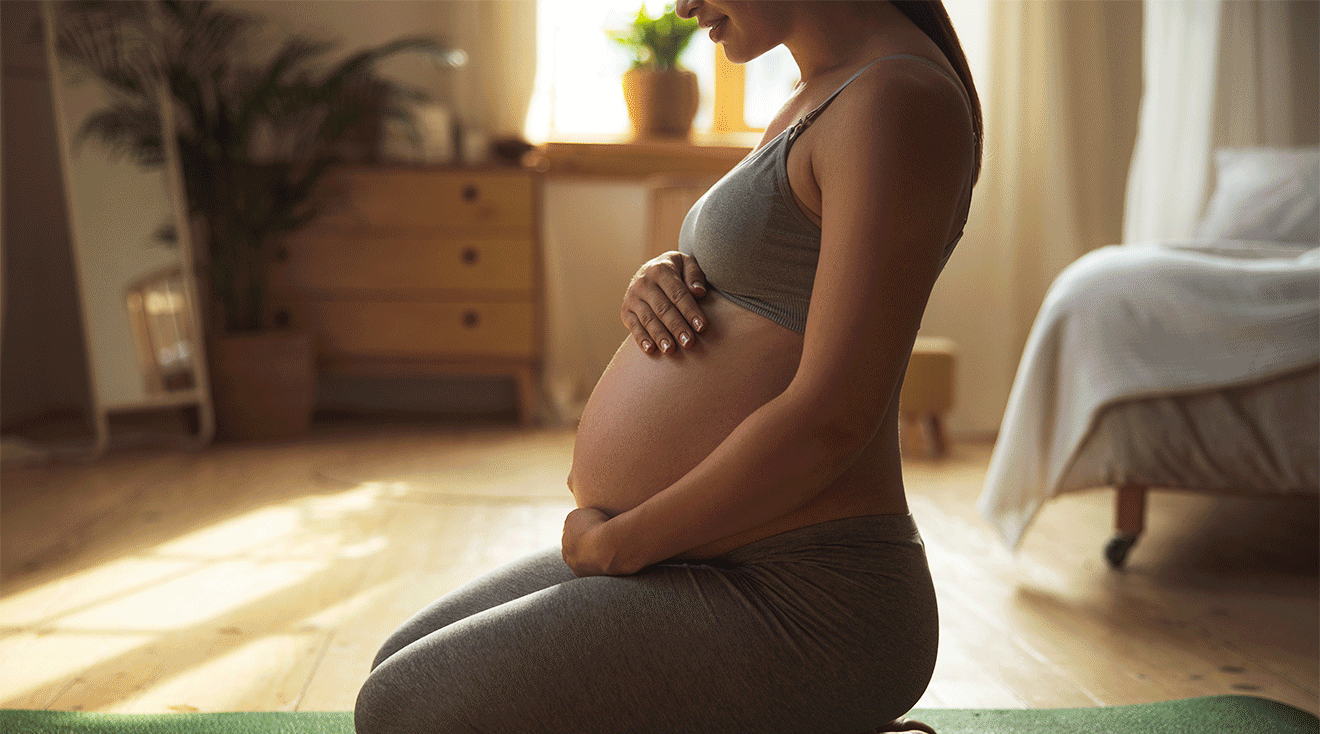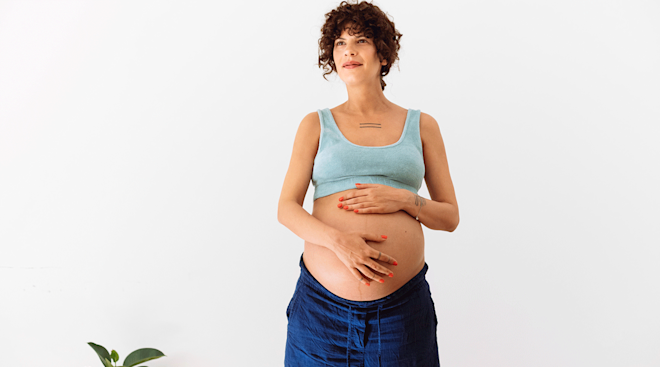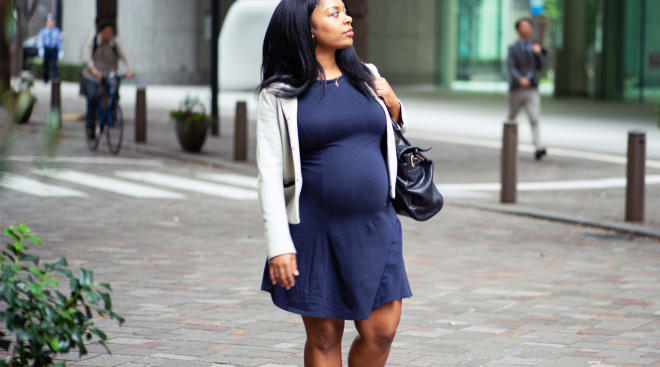How Moms-to-Be Can Manage Pregnancy Anxiety
Pregnancy can be a joyful time—but there’s a flip side as well. Many moms-to-be and pregnant people find themselves overwhelmed with anxiety during pregnancy. After all, you’re growing a tiny person inside your body and your whole life is about to change. Pregnancy anxiety is both common and completely understandable. “It’s scary not to know what’s going to happen, how your body will change, whether or not the baby be healthy, and how having a child will alter your life and identity overall,” says Perri Shaw Borish, MSS, LCSW, BCD, a psychotherapist and founder of Whole Heart Reproductive Mental Health in Philadelphia. We spoke with experts about what causes anxiety in pregnancy, strategies to relieve it, and how you can navigate its ebbs and flows with grace and resilience.
The American College of Obstetricians and Gynecologists (ACOG) describes anxiety as “a feeling of nervousness, worry or concern.” An anxiety disorder, says ACOG, is “a mental health condition that happens when anxiety gets in the way of daily life,” in which the anxiety is intense or lasts a long time.
If you’re experiencing anxiety for the first time during pregnancy, you’re not alone. Nearly one in five adults has an anxiety disorder, including those who are pregnant and postpartum, according to ACOG. “[Pregnancy anxiety] can feel isolating because, typically, people don’t openly speak about the anxiety they feel,” says Renée Goff, PsyD, PMH-C, a licensed clinical psychologist and owner of Orchid Wellness & Mentoring in Cincinnati, Ohio. “There’s a stigma to it due to society sending the message that ‘it’s supposed to be a happy time.’”
As a new mom and specialist in anxiety and other issues that affect women, Dena Franco, LCSW, a therapist at Here We Go Therapy in Atlanta, says she understands where expectant parents are coming from. “I felt hypervigilant and nervous around changes in my health and before every ultrasound with an overall feeling that something was wrong or something bad might happen,” Franco says. “I also had a lot of fears about childbirth and the postpartum period. I don’t know many people who didn’t experience some sort of anxiety during pregnancy, especially if it’s the first.”
Common signs of pregnancy anxiety include feeling “on edge or restless” more often than not, poor concentration because your mind is focused on anxious thoughts, feeling more irritable, trouble sleeping, and an “overwhelming sense of anxiety, panic or dread,” says Goff. Franco adds that you might frequently worry about baby’s health or your own and have a “sense that something bad might happen.” Physical sensations of anxiety include a racing heart and nausea, Franco adds.
Pregnancy anxiety, which can start anytime during pregnancy, can be triggered by biological changes, says Danielle Mari Panelli, MD, an ob-gyn and clinical instructor in maternal-fetal medicine at Stanford Medicine. “The relationship between biological changes in pregnancy and anxiety is complicated and can be a chicken-or-the-egg-type situation,” she says. “In general, the changes that occur in estrogen and progesterone during and after pregnancy are thought to be related to emotional changes.”
Risk factors for experiencing pregnancy anxiety
Some parents-to-be may be more likely to develop pregnancy anxiety than others. Panelli says that pregnant women with a past history of mental health conditions such as depression may be at an increased risk. “There’s … a high clinical overlap between depression and anxiety, and anxiety is less frequently screened for in pregnancy than depression is,” she says. Pregnancy complications such as preeclampsia and difficulty in prior pregnancies or with conceiving are also risk factors for anxiety during pregnancy, she says. She adds that sometimes people develop pregnancy anxiety without any of these risk factors.
Rest assured that it’s considered safe to take most antidepressants prescribed for pregnancy anxiety, including selective serotonin reuptake inhibitors (SSRIs), during pregnancy, says ACOG. One recent study found that antipsychotics, which can be used to treat anxiety, aren’t linked to childhood neurodevelopmental disorders or learning difficulties. While there are still a lot of gaps in the research on medication safety in pregnancy, this is promising news.
Ultimately, the decision on whether to take anxiety medicine during pregnancy should come down to a discussion between you and your provider. “A healthy mother is important for a healthy pregnancy and baby,” says ACOG. “There are risks of untreated mental health conditions during and after pregnancy. Remember that treating anxiety can help you, your fetus and your baby’s future health.”
If you’re looking for natural remedies for anxiety during pregnancy, there are lots of coping strategies and lifestyle changes that could help. Pregnancy is a great time to experiment and figure out what kind of self-care routine works for you, so you’ll have it in place for the postpartum period as well. Here’s what the experts recommend.
1. Acknowledge your anxiety
“The first step towards managing anxiety in pregnancy is recognizing that you’re experiencing it,” says Panelli. Once you have a better understanding of your pregnancy anxiety and what triggers it, you can manage it more effectively and start to seek help.
2. Seek support
Whether you choose a therapist, your partner or a few friends, having someone to act as a sounding board can be invaluable. But if you choose to confide in a pal, warns Brooklyn-based psychotherapist Rachel Magida, MPH, LCSW, “Make sure you pick the right kind of friend, meaning someone who can just listen, and sit with you in your anxiety and hold that for you, not necessarily giving you advice like ‘here’s what happened to me when I was pregnant,’ but say things like, 'I know this is so hard for you, I get it, and I’ve got your back.” Borish also recommends finding an expectant moms’ group, either online or in person. “Sharing resources, worries and feelings with others who are experiencing the same thing can be so helpful during pregnancy,” she says.
3. Get moving
“Rather than being up in your head, try to get back into your body, even if it’s just doing something simple like stretches at home,” says Magida. Pregnancy-specific workouts are great for this and are often easy to do from the comfort of your living room, but even a simple walk can boost your heart rate and do wonders for your mood. “Even if it’s not formal exercise, just getting outside in the fresh air and sunlight can really help, whatever movement you can get,” says Borish.
4. Learn to breathe properly
Pregnant women may already find themselves feeling a little short of breath, since by the second trimester they’re inhaling and exhaling 30 to 40 percent more air. (This is due to the hormone progesterone, which stimulates the lungs.) Of course, anxiety can also cause people to feel breathless, which doesn’t help. Both Magida and Borish recommend a technique called square breathing (also called box breathing or controlled breathing). Begin by slowly exhaling completely, then inhaling for four seconds, holding your breath for a count of four, exhaling for four seconds and holding your breath again for the same count before repeating. As you do it, imagine a square and that your breath is traveling up one side, across the top, back down and around the bottom. “Try practicing this when you aren’t feeling anxious, so when you do start to feel stressed, it will be one of your go-to tools,” says Borish, who adds that it can be especially helpful if you’re having trouble falling asleep.
5. Worry smartly
It may help to write your fears down on paper to help get them out of your head. “If you’re having what I call ‘ongoing spiraling,’ sit down for 10 or 15 minutes, maybe at the beginning of the day, and write down what’s bothering you in a journal or notebook,” says Magida. “Then close the book and set it aside, although if you have another worry later in the day, go back and add it.” If it helps, you can run through the list with your doctor and get the lowdown on what is and isn’t a real cause for concern.
Borish suggests keeping a pen and paper on your nightstand so you can jot down anxious thoughts if they strike overnight. “I’m not talking about your phone, but an actual pen and paper—so if you get woken up and start worrying, jot your thoughts down, and know that they will be there for you the next morning,” she says. Borish also suggests that patients set boundaries and give themselves what she calls “a set worry time” each day and once it’s over, try to put their unsettling thoughts aside.
6. Practice sleep hygiene
Although getting restful sleep can already be tough when you’re dealing with heartburn and an ever-growing belly, there are certain things you can do to help stack the deck in your favor. "It’s important to have a consistent bedtime as well as a bedtime routine,” Borish says. “Keep the lights off, turn off the TV and leave the phone in another room, and make sure the temperature is just right for a comfortable sleep environment. You also shouldn’t be using your bedroom to work or study—it’s just for sleep and sex.”
Other suggestions include avoiding caffeine late in the day and skipping naps if you find they make it hard for you to conk out at bedtime. That said, if you find that anxious thoughts are consistently keeping you awake, it might be time for some more support. “If you can’t fall asleep due to anxiety or depression, it’s a clear red flag that you can’t manage it on your own and you should seek help,” Borish says.
7. Ground yourself with calming words
If your mind is brimming with anxious thoughts, take a moment to center yourself. “Sit somewhere, plant your feet on the ground, look around the room and name the different things you see, like pillow, chair, couch, lamp,” says Magida.
If you can, try to focus on the present moment. “When you’re pregnant, staying present can be hard because there’s so much thinking about the future,” says Borish. “You have all these dreams and fantasies that you’re putting on the baby, but for some women, it can cause anxiety due to the lack of control.” Remind yourself that anxiety is just a feeling. “It might mean your brain is signaling that you need to pay attention, but it doesn’t mean there’s actually a threat or a danger,” Borish says.
8. Stay off Google
When you’re pregnant, it can be tempting to type in search terms every time you feel a strange new twinge, but if you’re already experiencing anxiety, this can just worsen it. “I tell my patients, you are not allowed to Google because you can find anything to support anything,” Borish says. “Try to get your information only from your provider or trusted sources.”
9. Be kind to yourself
As a mom-to-be, you’re balancing a ton of stuff at once, so treat yourself as you would a good friend—with compassion. “A lot of women are super-hard on themselves and are perfectionists, and there’s a sense that you need to get it all done,” says Borish. “Give yourself permission to do what you can and just be good enough, and be patient with yourself."
“If worried thoughts are interfering with your day-to-day life, such as making it difficult to work or engage in relationships with your loved ones, then it might be a good idea to seek professional help,” Franco says. Panelli adds that talking to your healthcare provider, even when things seem manageable, can help keep bigger problems at bay. “Mental health can have a stigma that makes people afraid to bring it up, but we want to encourage people that it’s okay to talk to us about these things! If it crosses your mind, bring it up,” Panelli says. “More importantly, if the anxiety symptoms progress into intrusive thoughts that threaten your health or the health of your family or those around you, we urge you to seek immediate help or call 911.”
Acknowledging pregnancy anxiety and opening up about it to a friend, loved one or professional isn’t easy. Take comfort in knowing you’re not alone and there are plenty of people and resources that can help you through this tough time. “I recommend that folks share openly about what they’re experiencing. After all, this is [only the] start of a long and anxiety-producing period of your life—parenthood!” says Franco. “Why not have support from the very beginning? And what a great example to model to your little one entering the world that it’s okay to feel worried and that they don’t have to go through it alone.”
Please note: The Bump and the materials and information it contains are not intended to, and do not constitute, medical or other health advice or diagnosis and should not be used as such. You should always consult with a qualified physician or health professional about your specific circumstances.
Plus, more from The Bump:
Perri Shaw Borish, MSS, LCSW, BCD, PMH-C, is the founder of Whole Heart Reproductive Mental Health, a group practice in Philadelphia specializing in perinatal mood and anxiety disorders, infertility, grief and loss. She’s a licensed clinical social worker and also holds a master’s degree in social science from the Bryn Mawr Graduate School of Social Work and Social Research.
Dena Franco, LCSW, works exclusively with women at Here We Go Therapy, an Atlanta-based practice that specializes in trauma work, anxiety and other issues that affect women. She holds a master’s degree in social work from the University of Maryland School of Social Work and a bachelor's of science in biopsychology, cognition and neuroscience from the University of Michigan.
Renée Goff, PsyD, PMH-C, is a licensed clinical psychologist and owner of Orchid Wellness & Mentoring in Cincinnati, Ohio. She received her doctor of psychology from Wright State University in Dayton, Ohio.
Rachel Magida, LCSW, is a psychotherapist in private practice in Brooklyn, New York, specializing in new mothers, young adults and life transitions. A licensed clinical social worker, she also holds a master’s degree in public health from the Columbia School of Public Health.
Danielle Mari Panelli, MD, is an ob-gyn at Stanford Medicine Children’s Health and a clinical instructor in maternal-fetal medicine at Stanford Medicine. She earned her medical degree from the University of California San Diego School of Medicine.
American College of Obstetricians and Gynecologists, Anxiety and Pregnancy, November 2021
UNSW Sydney, Study Eases Concern at Antipsychotics Use in Pregnancy, March 2024
Learn how we ensure the accuracy of our content through our editorial and medical review process.
Navigate forward to interact with the calendar and select a date. Press the question mark key to get the keyboard shortcuts for changing dates.





















































